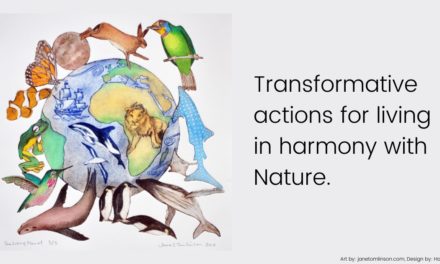
Mother Earth will only be preserved through a paradigm shift from a human-centric society to an Earth-centred global ecosystem. President of the General Assembly on International Mother Earth Day, 22 April 2020
The UN programme Harmony with Nature (where several swedes connected to Rights of Nature Sweden perticipate as experts) releases a report from the Secretary General every year. This years report is the 11th and it reflects on how the Covid-19 crisis is a reminder of the importance of a harmoniuos relationship between people and Nature, and that this relationship is dependent on societal and individual values and norms. The Rights of Nature/Earth Jurisprudence field is growing so fast that the report is accompanied by an appendix packed with examples of application and implementation.
From Sweden the report includes the parliamentary motion on Rights of Nture in the constitution, the decision from the Church of Sweden to include Rights of Nature in education, the creation of a new organisation for Ecopedagogy, the statement from the labor movement for ecocide as a crime, and the initiative to include Rights of Nature into the Convention on Biodiversity.
The report also spends some text on the need for alternative economics and how ecological economics and degrowth are currently expanding.
Excerpt:
”Over the past decade, an array of Earth-centred law, also known as Earth jurisprudence, has been gaining ground in an increasing number of Member States. Through the philosophy and practice of Earth jurisprudence, humanity accepts the reality that its well-being is derived from the well-being of the Earth and that, to sustain all life on the planet and guarantee future generations of all species, it is necessary to live in harmony with Nature and be guided by the laws of the Earth.
Values advanced by that paradigm, such as equity, cooperation, dialogue, inclusion, comprehension, agreement, respect and mutual inspiration, complement the same aspirations posited by ecological economics in the journey to move beyond the Anthropocene epoch. Such values contrast sharply with the prevailing logic of profitability as the raison d’être for our current growth-based economic system. Likewise, recognizing Nature as a subject of law contrasts sharply with current environmental protection laws, which are anthropocentric.
One of the fundamental reasons for the lack of effectiveness ofenvironmental law in protecting Nature lies in the fact that it never replaced the idea of the endless exploitation of the planet, facilitated by modern private law, with the concept of sustainability. In other words, the weakness of environmental law is directly linked to the fact that it always stopped at the door of private law.
Furthermore, environmental law entered the game when all the cards had already been drawn, and the new environmental public law of the 1960s and 1970s added only a few environmental duties to private property rights, without restrictions. Environmental law has therefore continued to be the “poor relative” of property and commercial law and can only promote insufficient measures on the periphery thereof.
In the past 50 years, although acknowledgement has grown that human rights are intertwined with the environment in which we live, environmental laws have largely failed to reduce pollution and prevent species and habitat loss on which human rights depend. Recognizing the rights of Nature in law fills that void and proves complementary to human rights.” (A/75/266 p. 8)
Link to the report United Nations A/75/266





